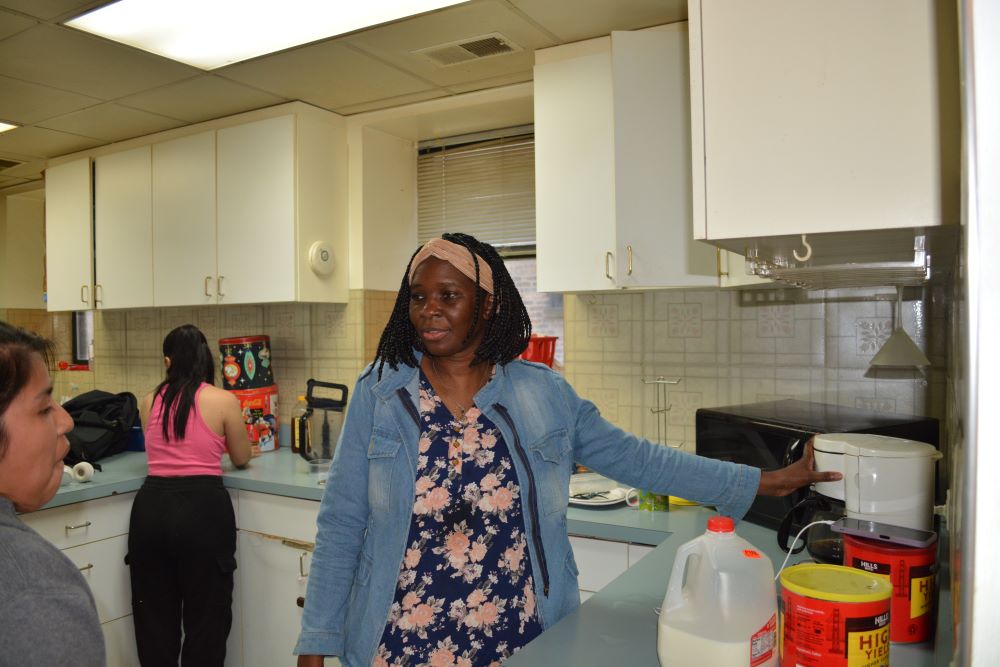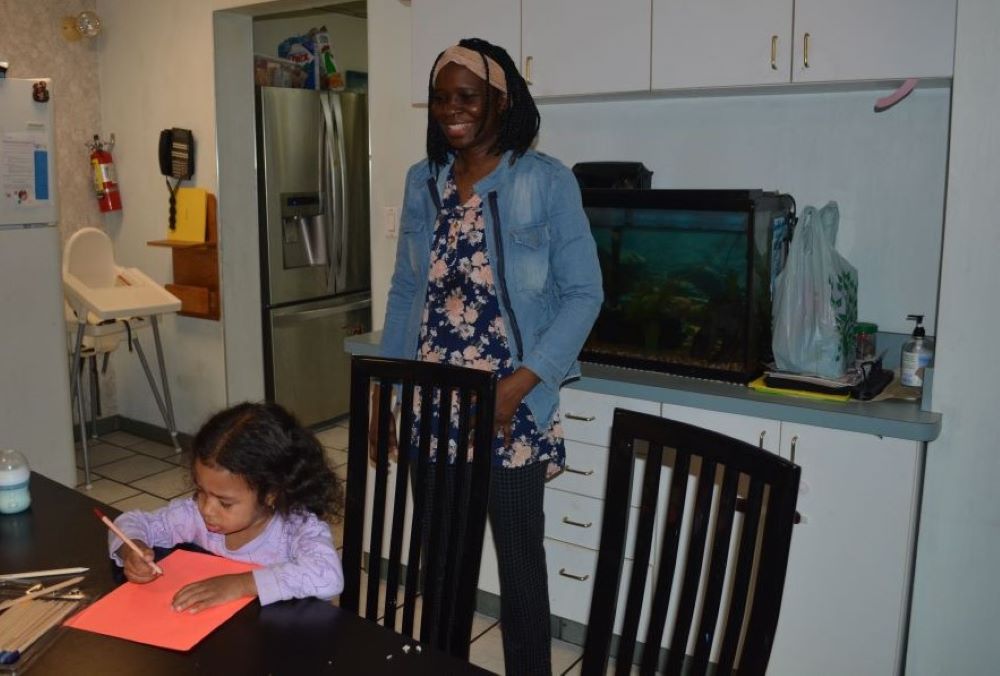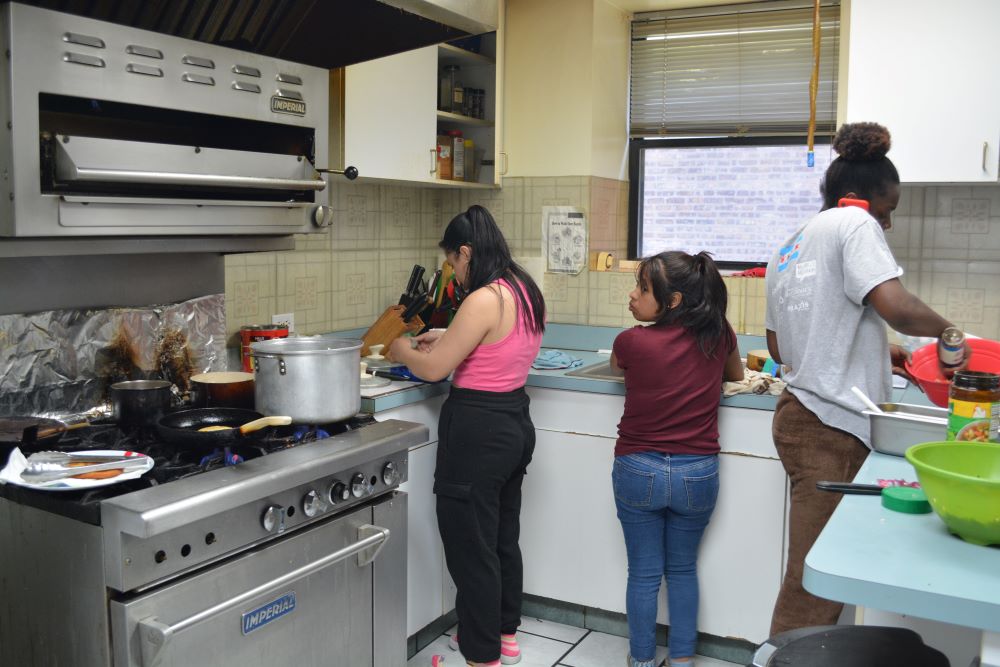
Franciscana Clarisa Sr. Stella Akello, intake officer at Bethany House of Hospitality in Chicago, gives a newly arrived Guatemalan woman a lesson in using the coffeemaker May 7. Most women stay at the house up to 10 months. (Simone Orendain)
Sr. Stella Akello, a Franciscana Clarisa, has been working with young adult refugees in Chicago for the past eight years. Originally from Uganda, Akello started her vocation as an elementary school teacher in Spain.
But the diminishing state of her community helped her find her true passion in aiding stateless young migrants to find their home in the United States. Akello, whose mother wanted to be a sister and whose older sister is a sister in Uganda, said she "felt the call" at age 20 and set off to join a Spain-based order that sought vocations in Africa.
During her first 10 years there, some of them as a school teacher, she saw a steady decline in vocations and decided to complete her clinical pastoral education in chaplaincy, studying in the U.S. Through a program working with refugees at Catholic Theological Union, where she has nearly finished her pastoral studies, she gained experience that would eventually turn her into a house mother to the dozen or so 18- to 25-year-old women at Chicago's Bethany House of Hospitality. She also became an errant hair and nail model for some of those young women, who practice on her to earn money.
On a damp, gray day at a three-level flat on Chicago's south side, Akello, 43, opened the door to Bethany House, sporting a bob-styled head of braids that she said gave her troubles.
"The first day I had to take ibuprofen because I couldn't sleep and the hair was paining and then I couldn't find a position," Akello said with a laugh. "I'm turning here, and then the head is getting heavy."
Franciscana Clarisa Sr. Stella Akello, intake officer at Bethany House of Hospitality in Chicago, shows a slideshow of her home life May 7. Pictures include those of housemates who were young adults she worked with in recent years. (Simone Orendain)
Global Sisters Report: What did you think when you first started working with refugees?
Akello: When I first came here, it started when I needed housing. I think I've always had that compassion. I've always had compassion looking at these people. [My schoolmate, also from Uganda] Sr. Jane Frances said this place [Illinois Community for Displaced Immigrants] is good, if you're interested. Coming up, growing up in a big family and then growing up in a poor family, I connected so I felt like this is part of me. You cannot just work with people if you don't have the vocation and the connection.
Then it was not a hard transition from school teacher to working with immigrants?
No, it was not a hard one because the school, you know you're dealing with many people. We had people from Colombia. We had Africans. I was already used to working with diverse people. And that's going back to my childhood. When we go to school, Uganda has 52 dialects. Everybody mostly speaks their dialects. That's how I ended up speaking many languages.
So you started with Illinois Community for Displaced Immigrants. How did you get the Bethany House work?
When they were closing the first stage of ICDI, Bethany House opened. The second stage means you'll be contributing to the community. So you go to work but then you're supposed to also contribute a little bit towards ICDI. But these desperate women who didn't have work permits … they had to go to Bethany House. That's why Darlene [Gramigna], the director of Bethany House, had to come to them. Darlene met me and said, "Would you be willing to join because I hear you do a great job here so how about you come with us?"

Franciscana Clarisa Sr. Stella Akello, intake officer at Bethany House of Hospitality for 18- to 25-year-old refugee women, spends time with residents' children after school is out May 7. (Simone Orendain)
Talk to me about the kinds of stories you hear from the people here and the kinds of needs they have.
The stories I hear a lot are the dangers in their countries: the gangs and then human trafficking and prostitution. So most of the ladies run away because they kidnap you and they're taken somewhere, taken to someone who's the boss and then they earn a living. For men, it's the gangs and the drugs. They train you into that. So they sell drugs. So most boys run away. The girls, then of course, there's rape and all that. Those are some of the things that make them flee their countries.
So when they come here, they come with a lot of trauma.
They come with a lot of trauma.
How do you minister to groups like that?
Listening to them. Most of them, they want to talk. When they come, when I do the intake with them, I don't ask them what happened. Just leave them. Do the intake and they will come. They'll look for you and they'll want to talk.
You can tell at what point they are ready to open up or they will seek out your help.
So we are all different and the coping mechanism is different for each one of us. Some of them open up easily. Some of them need time, so just leave them. Most of the time, this really affects their process because if you don't open up to the lawyer, how is he going to help you? The thing is, we try to assess them, look for the therapist to counsel them but most of them fall back, "It is the same thing they ask you, and ask you." It is like reliving and going back to their memories so they drop away.
Advertisement
Do they have to give full details in order for the government to determine whether they are, in fact, in need of asylum?
Yes, they have to do that. In fact, some of them have gone through double trauma. The trauma you go through when you're at your place, your parents' house, your village or your city and then the other trauma is when you're crossing [the border at Mexico]. We have the coyote people that also need their share. That's a lot. And they're also walking. Most of them arrive with swollen feet and days and days without eating. Just drinking water.
What is the success rate of the women once they come here? How are you certain that they will not fall back into a certain kind of life that may be destructive or may be hard for them?
There are all kinds of people: people who've learned from their past and people who go back. So with that there's really nothing we can do. We're talking about those ones who are used to being on the street and then they go with men. So when they go out there, of course they go back to that life. It's easy money. But some of them say, "I know why I came to this country and I want to prosper. I want to go to school and this is what I want."
What happens when you see some people going back to that life?
I feel like helping them. I've reached out to them. We've talked, and they said, "Yeah, I think I'm going to look for a counselor." So just talk to them. Listen to them.

Young women from Latin America and Africa work in the kitchen during after-school hours at Bethany House of Hospitality for 18- to 25-year-old refugee women May 7. (Simone Orendain)
What is the average stay of a young lady here?
The average stay is normally between 1 to 10 months. When they reach 10 months, sometimes even before, after they file their asylum, they're like, "I'm really tired, I want my independent life. I'm going with my uncle. I'm going with my cousin who is in New York. I've got a boyfriend so I'm moving with him." We talk to them, "Are you sure this is what you really want? Are you really sure you want to go?" We make them sign, "Yes, I want to go." "Are you going to be OK? Remember if you leave this house, we're not taking you back." Because this is not a hotel where you have reservations so you go try and come back.
… So they move in with this cousin or they move in with this boyfriend, it doesn't work, they say, I want to come back. It is a pity but if you say yes to one person, it's going to be to everyone else because they'll be wanting to.
Do you see anyone who stays here longer than 10 months?
People have stayed a little bit longer but when they get a work permit, they immediately begin preparing you. And there's also the Hilton grant, an organization that helps religious. Because Bethany has religious women who work with people like this, they donate. With the Hilton grant, Darlene came up with Beyond Bethany, which takes care of women who are transitioning. You got your work permit, so you got a job. We are going to help you pay for six months of rent.
So you have a long waiting list for Bethany House?
We have a long list [mostly from Latin America and Africa], again for now we're not taking people older than 25. Some are go-getters, they get jobs under the table. Once they come here for three months and begin looking for jobs, washing plates, they say "I want to go." And then they're off.
So would you say you are doing now what you want to do?
I think I'm happy with what I'm doing right now. I was a teacher back in Spain, but I don't think that was enough. I feel so happy and so much satisfaction feeling that you're helping people. Taking an extra mile to help people, it motivates me.






